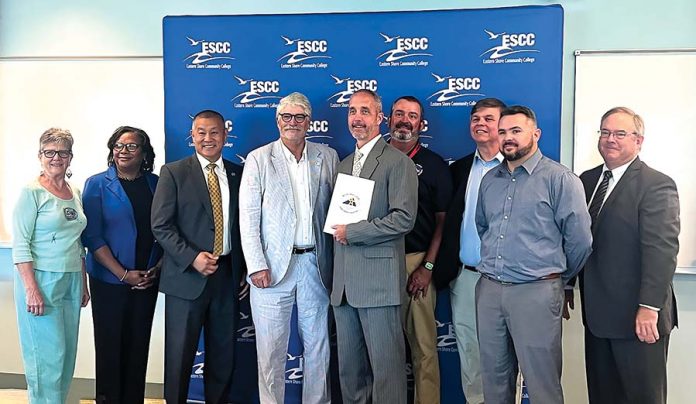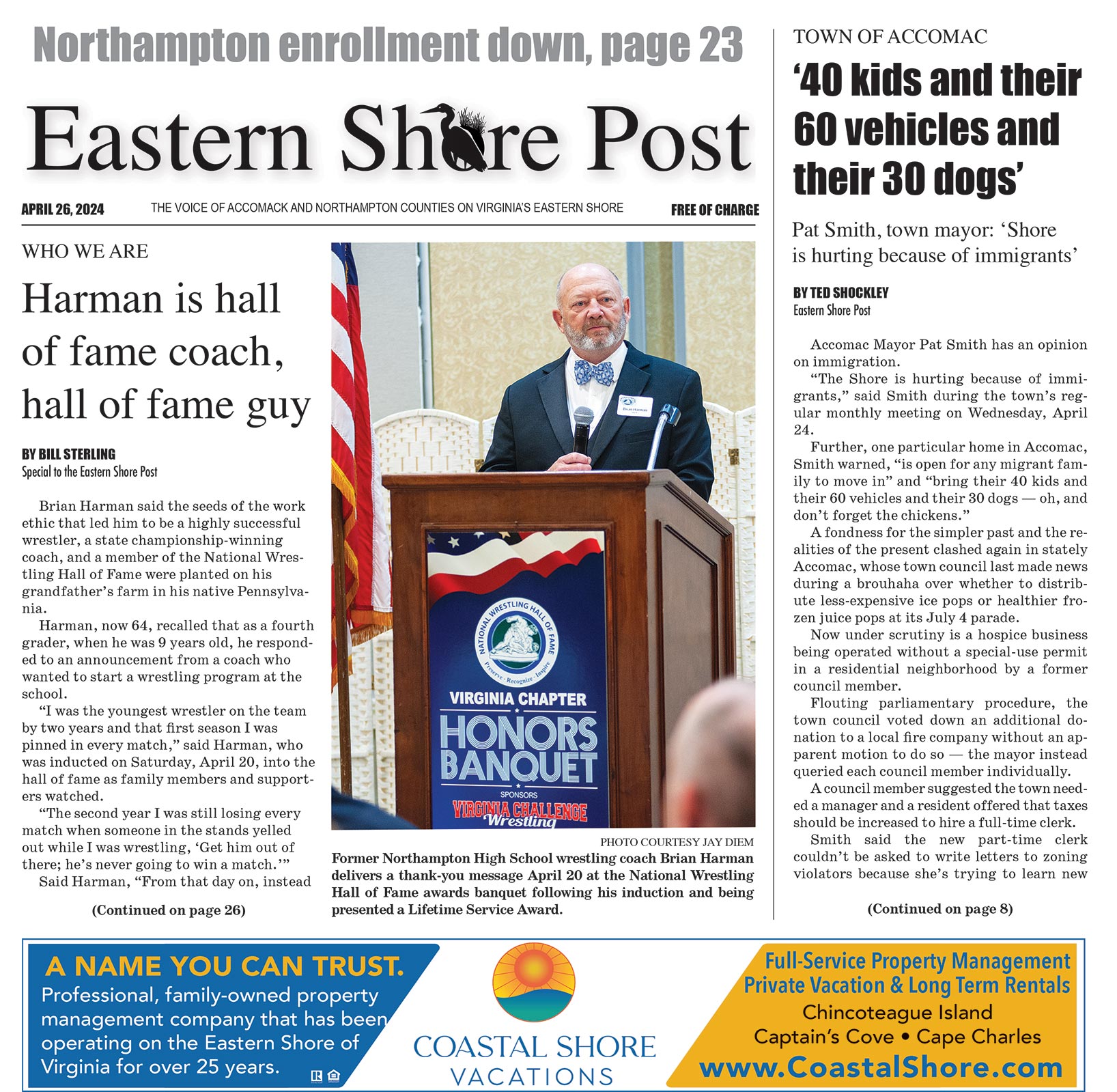
By Stefanie Jackson – Eastern Shore Community College is partnering with the Virginia Department of Labor and Industry to bring the state agency’s registered apprenticeship program to the Shore and help people find jobs that will pay living wages and become rewarding, long-term careers.
Patricia Morrison, DOLI’s director of the division of registered apprenticeship, repeated a concern shared by many residents of the Shore and other small, rural, underserved areas of Virginia: “the kids aren’t staying.”
The problem is that the Eastern Shore, which is known for growing crops like corn and soybeans, is doing little to grow its people – its workforce, Morrison said at a July 28 event at ESCC.
ESCC President James Shaeffer said 50% of the population of the Eastern Shore is either in poverty or working poor, aka ALICE (Asset-Limited, Income-Constrained, Employed).
One way to shrink that percentage is for employers to fill skilled jobs with local talent.
Some positions are hard to fill because the skills they require are held by few applicants, but if the employers participate in a registered apprenticeship program, they can “grow their own” talent and avoid wasting time, money, and effort recruiting employees from out of the region.
For example, Harold Cherrix, a Chincoteague native who works for the technology company Peraton, which supports the NASA Wallops Flight Facility, explained how difficult it is to find a computer numerical control or CNC journeyman machinist, even though the job pays $30 per hour.
Morrison said higher wages are not necessarily the top priority of potential job seekers and noted that some employers lose workers even after raising pay.
“What they want is the professional development, they want your expertise,” Morrison said.
Peraton will fill the machinist position through an apprenticeship program, and it may also use the program to hire an electrician and administrative personnel, Cherrix said.
The apprenticeship program is a win-win for employers and employees: the employees get good jobs with paid training, and the employers get the qualified help they need.
An apprenticeship also is “an easy way to clone your best employee,” Morrison added.
Employers must pay their apprentices at least minimum wage, which is currently $11 per hour in Virginia, but there is no cost for employers to participate in DOLI’s registered apprenticeship program.
There are also grant funds for employers who participate in the program.
Sean McCusty, alignment director for the DOLI registered apprenticeship program, reviewed the Commonwealth Registered Apprenticeship Future Talent or CRAFT grant, which is part of the Apprenticeship State Expansion grant provided by the U.S. Department of Labor.
The CRAFT grant is applicable to the industries of healthcare, information technology, manufacturing, agriculture, state and local government, hospitality, and logistics, to expand the apprenticeship program to those industries.
The program aims to target underserved groups such as veterans, people of color, youth, women, returning citizens, persons with disabilities, and Workforce Innovation and Opportunity Act participants.
Participating employers or sponsors create their own apprenticeship programs with guidance from DOLI. The employer sets the parameters for an apprentice’s education and training and the duration of the program. Tuition for required community college courses may be paid by the employer, the apprentice, or split between the two.
The CRAFT grant will reimburse an employer or sponsor who starts or expands an apprenticeship program up to $3,000 per apprentice to help cover the costs of the apprentice’s training, tuition, tools, equipment, and/or safety gear.
The maximum grant amount per employer is $36,000, or $3,000 each for up to 12 apprentices. The grant period ends June 30, 2023.
DOLI Commissioner Gary Pan said the apprenticeship program is a “powerful opportunity for employers” to gain employee loyalty.
McCusty noted that currently there are more jobs than job seekers, and an employer who creates an apprenticeship program has a “recruiting edge” because the employer is offering a “career pathway, not just a job.”
Jay Jones, of Kira Aerospace, Wallops Island, said consumers know “if we can’t find it on the shelf … we have to have it custom made” and the apprenticeship program will help his company “make quality, custom employees.”
He asked employers in the room “to encourage those young high school students and college students … let them know that there are good, well-paying jobs in the manufacturing industry, that you can make good money working with your hands.”
A four-year college degree isn’t the best fit for all young people, “but they can still have a great quality of life doing what they enjoy and what they were blessed with and given the talents to do,” Jones said.
There are two options for engaging high school students age 16 or older in an apprenticeship program. Career and technical education students can participate in a youth registered apprenticeship, and students who haven’t had the opportunity to get career and technical education can participate in a work-based learning apprenticeship.
Both programs provide on-the-job training and the opportunity to begin working full time after graduation.
Juanita Harris, a program specialist for DOLI’s division of registered apprenticeship who is based in the Norfolk office serving the Tidewater region, grew up on the Eastern Shore and agreed to travel regularly to the region to facilitate the program.
ESCC employees and partners who also will be involved with the apprenticeship program include Tina Stratton-Taylor, program manager for ESCC’s Workforce Innovation and Opportunity Act program; Linda Baines, career services mentor; Patty Kellam, executive director of the Eastern Shore Community College Foundation and ESCC’s director of development; and Scott Hall, workforce and business solutions officer.
The July 28 event also recognized companies who recently became official sponsors of DOLI’s registered apprenticeship program:
• Perdue Farms, of Accomac, represented by Bel Holden, complex human resources manager; Tripp Rouse, maintenance manager; and Robert Taylor, staffing recruiter.
- Peraton, of Wallops Island, represented by Harold Cherrix, production manager, and Jim Ruhl, machine shop manager
- Kira Aerospace, of Wallops Island, represented by Jay Jones, program manager, and John Farrell, lead journeyman CNC technician


